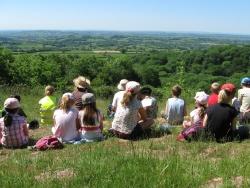Is our strongest wildlife lifeline facing the chop?
| Author: RSPB’s Grahame Madge | Published: 9th November 2012 08:32 |
 For the last 25 years, many UK farmers have become wildlife champions and have rallied to the plight of some of our most threatened species by creating the conditions they need to survive.
For the last 25 years, many UK farmers have become wildlife champions and have rallied to the plight of some of our most threatened species by creating the conditions they need to survive.
Using payments for wildlife-friendly farming - known as agri-environment schemes - some of these 'champions' have reversed population crashes of those species most in trouble and some species, including the cirl bunting and the stone-curlew, now largely depend on wildlife-friendly farmers for their future survival in the UK.
But just as conservationists and farmers are celebrating the 25th anniversary of these schemes and what they have achieved, the RSPB is fearful that cuts to European and domestic budgets mean the axe could be wielded close to this wildlife lifeline - potentially slashing the largest single budget for wildlife conservation in the UK.
Vital lifeline
Anxiety about the threats facing this funding has compelled the RSPB and the Wildlife Trusts to write to David Cameron urging him to defend this vital lifeline when he attends the European Heads of State meeting in Brussels, which not only protects nature, but also helps the Government achieve its own conservation objectives.
David Cameron will be attending the European Heads of State meeting in Brussels - on 22-23 November - to discuss the future of the EU's budget, including the amount of money spent on agriculture.
'We know that budgets are creaking,
but rewarding farmers for helping to keep wildlife on their land is excellent value for money and for taxpayers'
Darren Moorcroft is head of species and habitats conservation at the RSPB. He said: 'We know that budgets are creaking, but rewarding farmers for helping to keep wildlife on their land is excellent value for money and for taxpayers.'
Farmland wildlife is struggling as the populations of many species of birds, butterflies and bees continue to decline across the UK. The RSPB is concerned that the size of the budget for wildlife-friendly farming is already too small and in some parts of the UK funding for vital conservation projects has run out.
Darren Moorcroft added: 'The challenges facing wildlife are massive, and we believe an already unacceptably low share of EU funding goes to wildlife-friendly farming, especially when less than £7 out of every £100 spent on agriculture funds wildlife conservation. So, to consider further cuts is deeply misguided; we need more farmers helping wildlife, not less.
'Without this lifeline, we believe that several species, including the cirl bunting, which need farmers to create just the right kind of habitat, would slide inexorably towards oblivion in the UK, and other species, such as butterflies and rare plants, would inevitably decline.'
Since the first schemes were introduced in 1987, tens of thousands have helped wildlife on their land. Many - regardless of whether they produce crops, rear livestock or both - are keen advocates of the funding, which allows them to help wildlife as well as receive steady income in volatile times.
According to the latest official figures, in excess of 8.8 million hectares of land in the UK are covered by agri-environment scheme agreements. In England, over two-thirds of agricultural land is managed under a scheme.
Good work could be undone
 Gethin Owen, who farms in Wales, is the Welsh winner of last year's RSPB Nature of Farming Award. He is typical of many of the farmers supportive of wildlife-friendly farming payments. He said: 'There has been a lot of good work that's been done for wildlife over the last 10 or 20 years, and there is a real danger that all that good work could be undone, while this lifeline remains under threat.'
Gethin Owen, who farms in Wales, is the Welsh winner of last year's RSPB Nature of Farming Award. He is typical of many of the farmers supportive of wildlife-friendly farming payments. He said: 'There has been a lot of good work that's been done for wildlife over the last 10 or 20 years, and there is a real danger that all that good work could be undone, while this lifeline remains under threat.'
Henry Edmunds, who has a mixed arable and livestock farm in Wiltshire, is the winner of the 2012 RSPB Nature of Farming Award. He said: 'I think it would be an absolute disaster if these schemes were to stop.'
Dale Clanfield, who farms in the Fens of East Anglia, said: 'I love helping the wildlife on my farm, but I wouldn't be able to afford to keep doing it if it wasn't for funding from Europe. I'd rather see the money go towards supporting environmentally-friendly farming than just given out as subsidies.'
David Cameron will be meeting his European counterparts in Brussels on 22 and 23 November. The RSPB is calling on all those who care about the future of the funding that benefits our countryside to step up for nature and email him.
Report this article as inappropriate
Comments
You need to log in before you can do that! It's only a quick registration process to join the AMA network and completely free.



 Help
Help




 Loading...
Loading... Help
Help